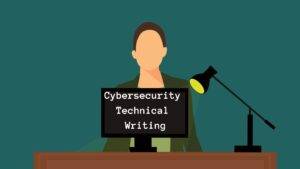
Cybersecurity is a realm of technology that is ever-expanding, ever-changing, and always searching for new ways to protect the systems and information of computers everywhere. Many people are working behind the screens to keep you and others safe, whether that be by working to develop programs to stop malware and trojans, taking down hackers, or even teaching large companies how to protect themselves from threats. There is a way for writers able to enter the technology world without having to understand complex programming or data analysis; becoming a cybersecurity technical writer. This position allows technical writers to demonstrate their expertise in writing and the creativity that comes from the research they do in a way that keeps data safe.
Does Cybersecurity Require Writing?
In a field as big as technology, what’s the use for those who write? Writing is a “soft skill”, which means a skill that is related to a person’s personality and efficiency. On the other hand, to explain topics in cybersecurity to other companies or potential clients, some use the assistance of a technical writer. A cybersecurity technical writer is someone who can analyze, create, and look over cybersecurity content, as well as translate that content into a more easily understood form. Technology-related fields need people who can create social media content, construct manuals, and oversee the editing of policies to cater to customers.
A technical writer’s job is to make sure that you can use all of the necessary skills to boost productivity and create whatever the company needs written up (audits, blog posts, white pages, case studies, etc.). Most importantly, a technical writer can take a presentation, ZOOM meeting, or even a podcast and summarize it for those who may have trouble understanding the context.
Responsibilities of Cybersecurity Technical Writers
First and foremost, cybersecurity technical writers help with the prevention of cyber threats. These writers specialize in research and data collection. With that in mind, they take what they learn from data manuals and other collection guides to create a cybersecurity plan. A cybersecurity plan involves listing out a company’s best defenses, showcasing the pros and cons of the system, and making a strategy to prevent future attacks as well as help the company recover from cyber-attacks. They also track down new threats and document every detail of the company’s cybersecurity strategies. Along with the cybersecurity plan and keeping documentation up to date, the job of a technical writer is to delegate what is important to inform the higher-ups about.
In addition, cybersecurity technical writers make sure that documents such as cybersecurity strategies and training manuals are clear and easy to understand. Cybersecurity documentation often contains complicated terms and concepts which many workers would have difficulty following along with. Therefore, a cybersecurity technical writer is necessary in order to clarify these ideas.
Distinguishing Cybersecurity Technical Writers and Other Technical Writers
While cybersecurity technical writers are similar to other technical writers in that both are responsible for making complicated documents easier to understand, there are also several differences between the two positions. The most prominent of these differences is that cybersecurity technical writers are more specialized than other technical writers, working almost solely on cybersecurity related tasks such as creating cybersecurity plans and training workers. General technical writers, meanwhile, may perform a wider variety of tasks related to fields other than cybersecurity, though they do not have the same level of expertise with any one field that a cybersecurity technical writer would.
Technical Skills Needed for Technical Writers
You can scour the internet to locate what skills are required for cybersecurity, but you will find an array of articles with differing opinions on what makes a good employee and technical writer. There are even some articles out there that give summarized versions of what constitutes a great cybersecurity writer. For that reason, here is a general list of technical skills needed for cybersecurity.
- Coding
- Troubleshooting/Problem Solving
- Networking and System Administrating
- Malware Prevention
- Cloud Security
- Well-versed in programming languages such as Java, Python, etc.
- Able to write security audits
How to Become a Cybersecurity Technical Writer
If you want to learn the aforementioned skills, try using Skill Share or a similar site for classes on cybersecurity. You can also earn certifications through online classes via the Sans website to flesh out your resume. Most importantly, you must have a bachelor’s degree in English, Communications, Journalism, or any field that requires writing as a skill. In addition, you should try to gather information about the tasks and intricacies involved in being a cybersecurity technical writer.
One important qualification that many companies are looking for when it comes to the field is that one has great attention to detail and can research the data before documenting it. The knowledge of content creation tools and programs is a major benefit for those wanting icons and logos created for their companies as well. This also has the added benefit of the inclusion of collaboration software that allows for edits on documents and teamwork to establish workplace relationships. Another skill that is vitally needed is creativity. While it is fine to have technical prowess, you must also be a creative writer to explain topics in detail to those who have little understanding of them.
What makes a Great Cybersecurity Technical Writer?
In the end, you must have good communication skills, an understanding of cybersecurity, and a willingness to learn new things. Many people will tell you various ways to improve your writing and update your repertoire with every passing year. While this advice is great, the main way you become better is to gain experience in the field. Research different companies and their requirements for becoming part of their writing team. Explore cybersecurity blogs and websites to keep up to date with the market. Create a portfolio of past articles and other written documents that you’ve done for other companies to entice recruiters.
Articles on How to be a Cybersecurity Technical Writer
Numerous articles regarding cybersecurity technical writers and the skills needed to be one can be found on the internet. Essential Data itself has several articles that can help with any additional questions you may have on the subject. It has articles that go over the reason why cybersecurity technical writers are needed in a company setting. Some articles explain in detail where to find these writers and how to hire them. EDC even has articles that will teach the pros and cons of becoming a cybersecurity technical writer.
Conclusion
The answer to the question of whether cybersecurity and writing go together is quite simple; yes. If you are a writer, going into tech will be beneficial at this time in the post-pandemic, remote working environment. In essence, writing and cybersecurity go hand in hand to create necessary content for everyone. Similarly, it’s also important to inform you what technical skills are needed for a job such as this. In the end, with enough experience and education, you can become a writer that any company would pay for.
How EDC can help
Whether you need a single technical writer for a brief project or a team of consultants to produce a complete line of documentation, the quality of our work is guaranteed for you. Our clients work closely with an Engagement Manager from one of our 30 local offices for the entire length of your project at no additional cost. Contact us at (800) 221-0093 or sales@edc.us to get started.
Written by Cecelia Lupton

